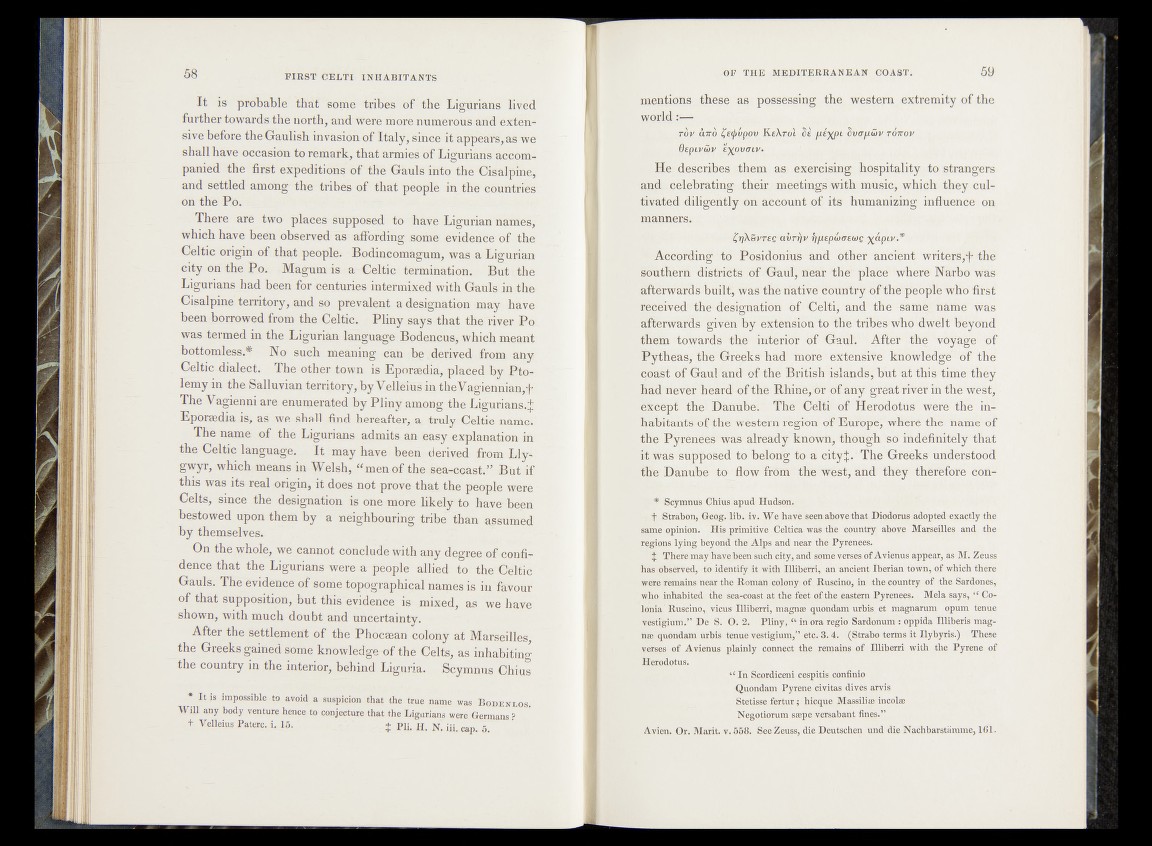
I t is probable that some tribes of the Ligurians lived
further towards the north, and: were m ore numerous, and extensive
before the Gaulish invasion of Italy, since it appears, as we
shall have occasion to remark, that armies of Ligurians accompanied
the first expeditions of the Gauls into the Cisalpine,
and settled among the tribes of that people in the countries
on the Po. |
There are two places supposed to have Ligurian names,
which have been observed as affording some evidence of the
Celtic origin of .that people. Bodincomagum, was a Ligurian
city on the Po. Magum is a Celtic termination. But the
Ligurians had been for centuries intermixed with Gauls in the
Cisalpine territory, and so prevalent a designation may have,
been borrowed from the Celtic. Pliny says that the river P q
was termed in the Ligurian language Bodencus, which meant
bottomless.* No such meaning can h§, derived from any
Celtic-dialect. The other town is Eporeodid*placed by Ptolemy
in the Salluvian territory, by Velleius in theVagfonnian,t
The Vagienni are enumerated by Pliny among the Ligurians.^
Eporsedia is, as we shall find hereafter, a. truly Celtic name.
The name of the Ligurians admits an easy explanation in
— ■" may have been derived from Llygwyr,
which means in-Welsh, ^men of the sea-coast.” But if
this was its real origin, it does not prove that, the people were
Celts, since the designation is one more likely to have been
bestowed upon them by a neighbouring tribe than assumed
by themselves. |
On the whole, we cannot conclude with any degree of confi-
dence that the Ligurians were a people allied to the Celtic
Gauls. The evidence of some topographical names is in favour
of that supposition, but this evidence is mixed, as we have
shown, with much doubt and uncertainty.
After the settlement of the Phocaean colony at Marseilles
the Greeks gained some knowledgerof the Celts, as inhabiting
the country in the interior, behind Liguria. Scymnus Chius
* I t is impossible to avoid a suspicion that the true name was Bodejjxos
W ill any body venture hence to conjecture that the Ligurians were Germans ?
t Velleius Patere. i t \ b . . V . $ PIL H. M UL cap. 5 .'
jpeptions, tbe^e, as, possessing the western extremity of the
world:—
T€v airo ^styvpov KeXrot juivjOi dyg/iiov róirov
Q e p iy& v t ^ o v a i v -
He dosóribes them as.4 exercising hospitality, to strangers
and celebrating their meetings'With^music, which they cultivated
diligently ©h^account of its humanizing influence on,
manners.
ZrjXëvtes avrrjv rj/iepwiTebic j^apiv.*
ppAccording to Posidonius and %her‘ +'anc^K-fi writers,f the
southern district^;'Gaul; Hear the" placé’ wlforb- Narbo was
afterwards b o f thfipe^Ie who first
^cëivédWted^gi|atibniBf^©èl^'StMNjhe name was
“afterwards f|fi$en by extension to^Mie^M^S who’dwért'béyond
them towards the ’ imlrfoi- of GasJP'. ;6f
Pytheas, the Gr e é ks * * hÉt e n f i v ë knowléog^^» the
rewst of Gaul and of thejfBfetish isldndl^ul'm ihis%ime'Mcy
had riever ‘heardlqf the Rhii^^Möf any?1 sgE^t"nVèt' m tTié wl%,
lllcept the - Danube. The Cêft$i>ï HerodotuS'3 Wpre the in-
habitantl^o^iïfè''wéltirn^Tegi'ón of Euró'pbf wh’etë the^nath^»f
the Pyrèn^és^ was already known, thtiugnpfp indefinitely that
fttVas supposed to betoifg:to a cityj. 'The‘Greeks 'understood
the Danube toi^flow fröifi"rthé west, and they therefore con-
* Scymnus Chius apud Hudson.
f Strabon, Geog. lib. iv. We have seen above that Diodorus adopted exactly the
same opinion. Hie primitive Celtica was the country above Marseilles and the
regions lying beyond the Alps and near the Pyrenees.
There may have been such city, and some verses'of AviemlSappear, as M. Zeuss
has observed, to identify it with Illiberri, an ancient Iberian town, of which there
were remains near the Roman cojonyrof Ruseino, in the country of the Sardones,
who inhabited the, sea-coast at the feet of the eastern Pyrenees. Mela says, ‘.‘Oo*
Ionia Ruscino, vicus' Illiberri, magnss quondam urbis, et magnarum opum tenue
vestigium.” De S'^H. 2. Pliny, “ in ora regib' Sardonum: oppida Hliberis mag-
hbb quondam urbis tenue vestigium,” otts.'S. 4. {Strabo terms itsJlybyri«.} These
verses of Avienus plainly connect the remains of Illiberri with the Pyrene of
Herodotus.
“ In Scordiceni cespitis confinio
Quondam Pyrene ciyitas dives arvis
Stetisse fertur; hicque Massilitp incohc
Negotiorum saspe versabant fines.”
Aviera. Or. Matit. v. 558. See Zeuss, die Deutschen und die Nachbarstamme, 161.